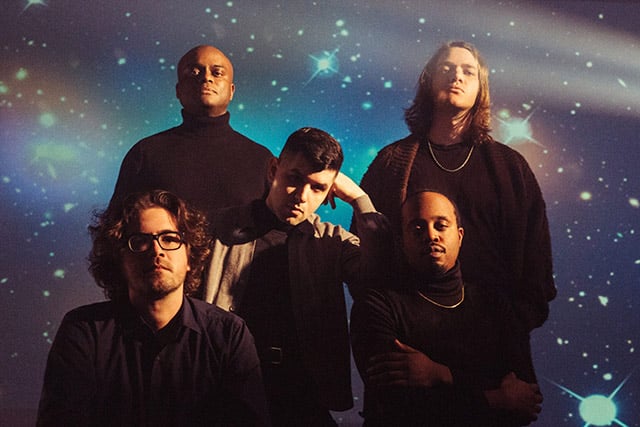
Photo by Ebru Yildiz
Looking back, it’s hard to believe that Durand Jones & the Indications is the same band which, just six years ago, recorded their self-titled debut album in a musty Indiana basement on a budget that, according to their receipts, came out to $452.11. According to Dusty Groove, an online mecca for vintage soul collectors, it was “easily one of the best deep soul albums we’ve heard in years.”
Sophomore album “American Love Call,” released two years into the Trump administration in 2019, found the band taking a more overtly political turn. Opening track “Morning in America,” written by drummer and co-vocalist Aaron Frazer, borrowed Ronald Reagan’s 1984 campaign slogan to describe a nation that, in many ways, hasn’t changed: “I think of my grandmother / How she told me to be strong / It’s morning in America / But I can’t see the dawn.”
For the latest Durand Jones & the Indications album, “Private Space,” the band recruited 15 additional musicians to create a sound that, in its more synthesizer-and-string- enhanced moments, recalls Earth Wind & Fire and The Gap Band more than it does Marvin Gaye and Sam Cooke.
Lyrically, there are references to modern-day lynchings and people being overtaken by disease, but there are also plenty of love songs and party anthems to balance things out. As Allmusic reviewer Andy Kellman put it, “None of the Indications’ contemporaries have put together a set as distinctly purpose-built and delightful as this one.”
In this interview (taken by e-mail after phones were put out of service by a storm), Frazer touches on the band’s musical evolution, non-stop crate digging, and double-masked recording sessions.
Q: Going as far back to Sam Cooke’s “A Change Is Gonna Come” and Gil Scott-Heron’s “Winter in America,” soul musicians have often combined the personal with the political. Is it important to the band to follow in those footsteps?
Aaron Frazer: It’s important but it’s also natural. People like Gil Scott-Heron, Sam Cooke, Curtis Mayfield, all understood that to engage politically, you also have to make room for partying, making love, being silly, grieving. Otherwise, you’re gonna burn out.
Q: The last time I checked on Spotify, the “Indications Inspiration” playlist had reached 79 hours and 31 minutes, with more and more artists I’ve never heard of being added to it. Are there any record crates left in Bloomington that you guys haven’t already dug through?
Frazer: Hah-hah there’s always more bins! That’s kind of the beautiful thing about music. The bar for entry is super low, you don’t even need instruments to make it; that means so so so many people have recorded music and been able to release it into the world. And that means no matter how much you’ve listened to, no matter how much of an expert aficionado you might be, there’s always more to learn, experience and enjoy.
Q: Back in the ’70s, Earth Wind & Fire created a really distinctive sound with the combination of Philip Bailey’s falsetto vocals and Maurice White’s baritone. You and Durand have a similar thing going on today. Did you realize how special that was when you were starting out?
Frazer: We definitely felt like it was a special thing. Each lead voice helps accentuate what the other does, rather than overshadowing it.
Q: Durand’s vocals sound a little less raspy, a little more smooth, to me on “Private Space.” Was that a conscious decision, or am I just imagining it?
Frazer: Not imagining it! His voice is definitely smoother on this. I think that’s partially a choice and partially his voice naturally maturing. The voice is such a unique instrument because it changes with time. You can’t fight it — you can learn to work with its evolving sound and maximize it.
Q: “Private Space” features the group 79.5 on backup vocals. The album also features vibraphonist Joel Ross and an eight-piece string section. What was it like to pull all that off during a pandemic?
Frazer: The studio portions of the record were definitely stressful, because we were putting our health on the line, as well as our friends’ that we called in to play on the album. Plus, you’re having to talk through double masks for hours at a time, which takes a toll on your vocal health.
But we also did some of the album in upstate NY at a snowy cabin, just the core band. That time was really beautiful because we were isolated from the rest of the world, and in a way, it felt like being back in the basement in Bloomington working on our first record. We weren’t on the clock in a recording studio, so we had a chance to slow down, experiment, take long breaks to play dominos or Mario Kart. And if we suddenly got the inspiration to record at 3 a.m., we could fire up the laptop and hit record.
Q: How was the music you started out playing in your Sunday night jam sessions different from what we hear on “Private Space”?
Frazer: I think a lot of it comes down to experience. When we started, we’d never tried writing in this style before. With every new batch of songs, we learn lessons and apply them to the next batch. But we always try to keep that same spirit of exploration and fun that we started with. Otherwise, what’s the point?
– Bill Forman, Last Word Features
- Durand Jones & the Indications
- Special guest: La Dona
- When: Sunday, May 22
- Where: Cargo Concert Hall
- Tickets: $25

